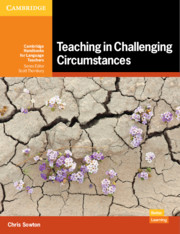Book contents
- Frontmatter
- Contents
- Thanks
- Acknowledgements
- Introduction
- I Creating a good environment for language learning
- II Being effective in the classroom
- III Teaching large classes
- IV Teaching language skills and systems
- V Teaching language without textbooks
- VI Teaching language with textbooks
- VII Helping students achieve their potential
- VIII Linking the school to the outside world
- IX Supporting yourself and others
- Glossary
- Index
7 - Teaching inexperienced students
Published online by Cambridge University Press: 22 September 2021
- Frontmatter
- Contents
- Thanks
- Acknowledgements
- Introduction
- I Creating a good environment for language learning
- II Being effective in the classroom
- III Teaching large classes
- IV Teaching language skills and systems
- V Teaching language without textbooks
- VI Teaching language with textbooks
- VII Helping students achieve their potential
- VIII Linking the school to the outside world
- IX Supporting yourself and others
- Glossary
- Index
Summary
Every child in every classroom brings a history to school.
Sarah Dryden-PetersonThe short version
1 Students living in challenging circumstances may have little or no experience of formal (or even informal or non-formal) education for a wide variety of reasons.
2 Inexperienced students may feel shy, nervous or even vulnerable when attending school. This may be caused in part by a lack of ability in their own L1.
3 These students may also lack basic classroom skills, which some of their peers have developed over time.
4 Bad behaviour and disruption in class may be caused by a wide range of underlying factors, such as confusion, frustration or embarrassment.
5 Despite the challenges faced by inexperienced students, there may also be some opportunities – e.g. a more positive, dynamic approach to education.
Introduction
1 How do you feel when you do something new? Think of a recent experience when you faced this situation.
2 What challenges do inexperienced students face when coming to school? Consider some of the ideas below.
Why some students may not have much experience of education
Students learning in challenging circumstances may have little or no experience of education, either within the home or in formal institutions, such as schools. Reasons for this may be that:
• they are from a low socio-economic background and are unable to afford the ▸direct costs or ▸opportunity costs of sending them to school;
• their parents may not be literate and may have had no formal education themselves; as a result, they may therefore be unable (or feel they are unable) to help their children in practical terms;
• because of their personal circumstances, their parents may lack the mental or emotional ability to support their children's education;
• they are ▸refugees or have been ▸internally displaced, and schools are generally found in a fixed location;
• even when children may have been to formal schools, the quality of education which they received may have been poor.
Depending on the situation, your students lack of formal education experience may actually have some advantages. For example, they may:
• have a very positive attitude to education, seeing it as a privilege and not something they have to do;
• have avoided some of the negative ‘conditioning’ aspects of formal education;
• be more willing to involve themselves in more community- / environment-based learning activities (see ▸Chapters 18 and 28).
Information
- Type
- Chapter
- Information
- Teaching in Challenging Circumstances , pp. 46 - 50Publisher: Cambridge University PressPrint publication year: 2021
